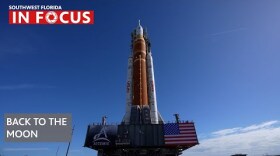-
Next month, the window will officially be open for a NASA manned flight that will circumnavigate Earth’s closest celestial partner to track potential landing sites for an official moon landing.
-
Bob Rauschenberg was brought to NASA to develop art to commemorate the moon landing. However, he wasn’t content with his art that celebrates the exploration of space lying dormant on Earth.
-
Winston Scott grew up in Miami and attended Florida State University to study music. While at FSU he started getting into engineering and at one point the word astronaut flashed briefly through his mind. So, after graduating in 1972, he entered Naval Aviation Officer Candidate School and two years later became a Naval Aviator and served as a production test pilot flying the F/A-18 Hornet at A-7 Corsair. Mr. Scott was then selected by NASA to become an astronaut and reported to the Johnson Space Center in 1992. These days he’s Director of Operational Excellence at the Kennedy Space Center Visitor’s Complex and in that role was touring last week so we brough him by the studio to talk about being an astronaut, and what goes on at the KSC Visitor’s Complex.
-
Many companies are looking to Florida to be the leader in the future of space travel. To meet this growing demand, Charlotte County is looking to expand its educational aerospace program.
-
Over the decades, the nonprofit Calusa Nature Center and Planetarium has introduced countless people of all ages to the natural world, and the cosmos, through educational programs. Their 105-acre site features a natural history museum with live native and teaching animals, a butterfly garden and raptor aviary, as well as exhibits about the animals, plants, and environment of Southwest Florida. And they host events like music under the stars, paint and sips, night hikes, summer camps, and even an event called Potter in the Park. We sat down in their planetarium on a Saturday morning to shine some light on the work they do and the resources they provide to the community.
-
Many children dream one day of walking among the stars. For Retired Navy Captain Winston Scott, that reality was manifested when he was selected for NASA’s Astronaut Program.
-
55 years ago, the world was captivated by the Apollo 13th mission. Three astronauts were trying to find a way back to Earth and Mission Control worked overtime to ensure every variable was ready.
-
Winston Scott grew up in Miami and attended Florida State University to study music. While at FSU he started getting into engineering and at one point the word astronaut flashed briefly through his mind. So, after graduating in 1972, he entered Naval Aviation Officer Candidate School and two years later became a Naval Aviator and served as a production test pilot flying the F/A-18 Hornet at A-7 Corsair. Mr. Scott was then selected by NASA to become an astronaut and reported to the Johnson Space Center in 1992. These days he’s Director of Operational Excellence at the Kennedy Space Center Visitor’s Complex and in that role was touring last week so we brough him by the studio to talk about being an astronaut, and what goes on at the KSC Visitor’s Complex.
-
Over the decades, the nonprofit Calusa Nature Center and Planetarium has introduced countless people of all ages to the natural world, and the cosmos, through educational programs. Their 105-acre site features a natural history museum with live native and teaching animals, a butterfly garden and raptor aviary, as well as exhibits about the animals, plants, and environment of Southwest Florida. And they host events like music under the stars, paint and sips, night hikes, summer camps, and even an event called Potter in the Park. We sat down in their planetarium on a Saturday morning to shine some light on the work they do and the resources they provide to the community.
-
There's a space race brewing within The Sunshine State. Companies are spending billions in returning to space and giving a boost to Florida's economy in the process.
Play Live Radio
Next Up:
0:00
0:00
Available On Air Stations








